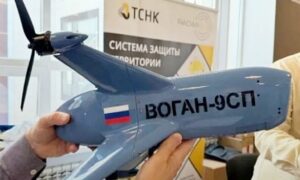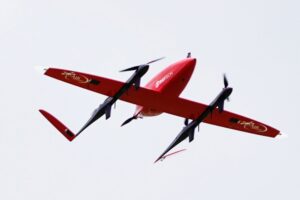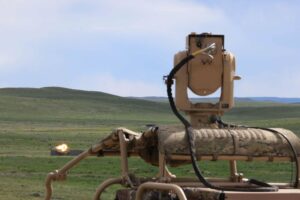All eyes in the drone industry right now seem to be on the Countering CCP Drones Act, which is a Republican-led piece of legislation that could ban Chinese drones — specifically made by DJI. But House Republicans have another, proposal that’s potentially considered a bit bizarre. That’s to dissect a DJI drone.
Under Section 223 of the National Defense Authorization Act (NDAA) for Fiscal Year (FY) 2025, the Sectary of Defense (or more likely someone who works for them) would be required to “fully disassemble a drone aircraft made by the Chinese technology company Da Jiang Innovations (DJI)”. The reason why? According to the bill’s text, it’s to “determine the origin of each component of such drone aircraft.”
The text doesn’t specify which drone exactly. And DJI certainly has quite a range of products, from the ultra-low cost DJI Mini 4K, which costs less than $300, to high-end drones that target Hollywood filmmakers like the DJI Inspire 2. And where lawmakers seem deeply concerned about the capabilities of DJI’s camera drones for spying on critical infrastructure, DJI makes all sorts of camera gear. That ranges from the Osmo Action camera to a TikToker’s favorite, the Osmo Pocket 3 (perhaps not coincidentally, the same lawmakers seeking to ban DJI are also seeking to ban TikTok).
Here’s the full text of the proposed requirement that the government perform a formal DJI drone dissection, from Section 223 found on page 91 of the latest version of the bill:
SEC. 223. DISMANTLEMENT OF CHINESE DRONE AIRCRAFT TO IDENTIFY THE ORIGIN OF COMPONENTS AND SECURITY VULNERABILITIES.
Not later than 90 days after the date of the enactment of this Act, the Secretary of Defense, acting through the head of the Defense Technology Security Administration and in coordination with the Director of the Defense Innovation Unit, shall fully disassemble a drone aircraft made by the Chinese technology company Da Jiang Innovations (DJI); and determine the origin of each component of such drone aircraft.
After completing the actions required under subsection (a), the Secretary of Defense shall submit to the Committees on Armed Services of the Senate and the House of Representatives a report that includes— a list of each component found in the drone, including the origin of the component and manufacturer information; a description of any security vulnerabilities that were identified in the course of disassembling the drone.
The report required under subsection (b) shall be submitted in unclassified form, but may include
a classified annex.
Section 223, HR 8070
Why do House Republicans want to dissect a DJI drone?
No, this isn’t a fun drone project for a STEM class (but hey, it could be!). Instead, the move underscores growing concerns that some politicians — namely Republicans — have over national security and technological vulnerabilities. It all rolls up into a House Republican initiative directed at compelling the Department of Defense to dismantle and scrutinize drones manufactured by DJI.
The primary objective is twofold:
- to meticulously trace the origin of each component embedded within the drone
- to identify any inherent security vulnerabilities that could compromise national defense or data integrity.
The impetus for this initiative stems from longstanding apprehensions surrounding the use of Chinese-made technology. That’s not just DJI, but other big Chinese companies like TikTok.
Alas, DJI — which is a prominent player in the global drone market — has faced scrutiny over data security concerns. It’s also been accused of ties to the Chinese government, which DJI has often denied. Other Chinese drone companies, including Autel, have largely escaped such scrutiny.
What happens after the DJI dissection?
This would hardly be the first time anyone has dissected a DJI drone. But it might be the first one done in an official government capacity.
Now it’s first worth noting that this may never happen. While the National Defense Authorization Act (NDAA) for Fiscal Year (FY) 2025 passed in June 2024 in the House of Representatives, it was only by a narrow margin. What’s more, that largely fell along party lines. It still needs to go to the Senate, and will ultimately land on the president’s desk.
It’s unlikely this exact bill will be what the president sees. In fact, controversial or otherwise nonsensical measures often do end up getting stripped out or heavily modified. That’s in order to pass both chambers — and avoid a presidential veto.
But let’s just say it does pass, and the DJI dissection happens. It’ll be quick, as the bill mandates it happen within 90 days (about three months) of the act’s enactment.
Upon completion of the disassembly process, the Secretary of Defense is mandated to submit a detailed report to the Senate and House Committees on Armed Services. This report will include:
- A comprehensive list of every component found within the DJI drone
- Information regarding the origin and manufacturer of each component.
- An assessment outlining any identified security vulnerabilities uncovered during the disassembly process.
And, it’ll all become public information. We’ll be watching for it if it happens.
That said — while the main report will be unclassified to ensure transparency — there may be a classified component. After all, a provision exists for a classified annex to address sensitive findings that may impact national security protocols or ongoing defense strategies.
The post House Republicans want to dissect a DJI drone, and here’s why appeared first on The Drone Girl.
 The results of AAUS‘ RPAS Industry Survey for 2024 are now available to download from the AAUS website. The objective of these surveys is to gain feedback from industry and use that information to guide our advocacy strategy to meet the needs of our members and the constantly evolving industry. From the data we received […]
The results of AAUS‘ RPAS Industry Survey for 2024 are now available to download from the AAUS website. The objective of these surveys is to gain feedback from industry and use that information to guide our advocacy strategy to meet the needs of our members and the constantly evolving industry. From the data we received […] The results of AAUS‘ RPAS Industry Survey for 2024 are now available to download from the AAUS website. The objective of these surveys is to gain feedback from industry and use that information to guide our advocacy strategy to meet the needs of our members and the constantly evolving industry. From the data we received […]
The results of AAUS‘ RPAS Industry Survey for 2024 are now available to download from the AAUS website. The objective of these surveys is to gain feedback from industry and use that information to guide our advocacy strategy to meet the needs of our members and the constantly evolving industry. From the data we received […]



